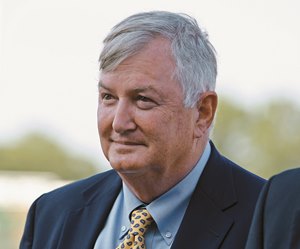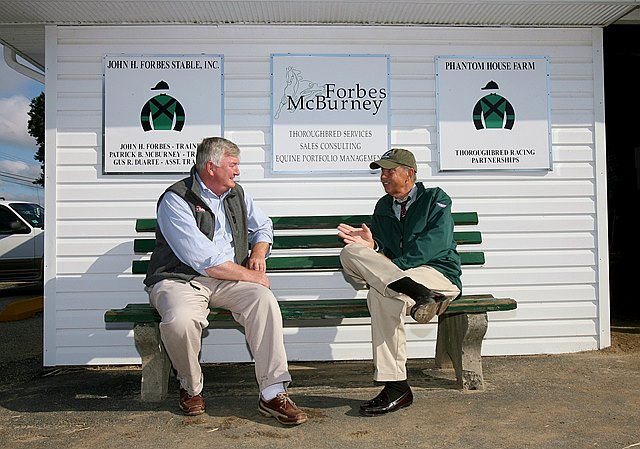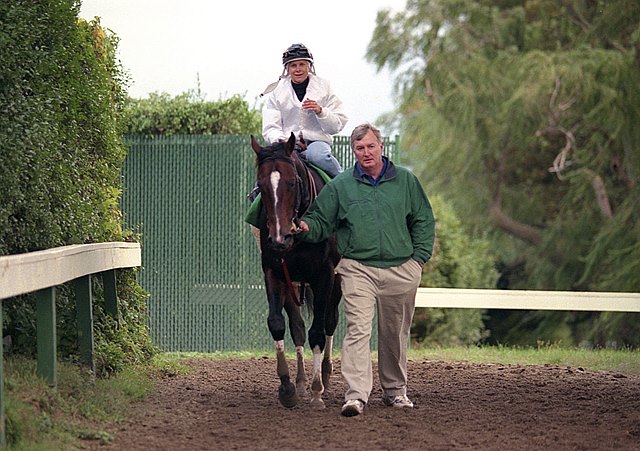Forbes Leaves Indelible Mark on New Jersey Racing


The past two and a half weeks have left trainer Pat McBurney with several feelings that have overwhelmed him at times.
At first there was grief. Then there was a strange, empty feeling.
For more than four decades, McBurney had a rock he could always lean on. Someone he worked alongside. Someone who would call or visit with him on a daily basis and help guide him thorough life in every possible way.
Then, on Jan. 31, McBurney received the crushing news that his mentor, boss, father figure, and dear friend John H. Forbes had passed at the age of 73 due to complications from a battle with cancer.
"I was just amazed by the texts, emails, and phone calls I received from so many people, including people I hadn't heard from in years, with condolences about John. Everyone loved him and respected him," said the 64-year-old McBurney. "Even after he retired from training (in 2012) he'd still come to the barn and I'd talk with him and learn so much about all ends of the business and life. He'd go to sales with me and call me all the time. It's been very strange for me without those calls every day."
Like a legion of people across the horse racing industry who have mourned the longtime former trainer and New Jersey horsemen's leader, McBurney was devastated by the news of Forbes' passing. Yet for him, it brought out the added emotions built through so many years of serving as Forbes' trusted right-hand aide and confidante. After they both worked for John Tammaro Sr., he first worked for Forbes in 1976 and served as his main assistant until 2007 when Forbes turned the bulk of his stable over to McBurney prior to his 2012 retirement. More than most people, he understood the class, horsemanship, and leadership that made Forbes such a beloved figure in New Jersey racing circles.
"John meant the world to me and he touched so many people in a positive way," McBurney said. "It will be hard to imagine Monmouth Park without John, but Monmouth Park will forever be better because of John."
The difficulty in saying what Forbes should be best known for explains the huge impact he had on New Jersey racing. He was the all-time winningest Thoroughbred trainer in New Jersey, and a dominant trainer on the Mid-Atlantic circuit for decades who was an expert at the claiming game yet also developed a horse with physical issues into a graded-stakes winning colt who attracted a stallion deal in excess of $11 million.
For 30 years as a leader and respected voice for New Jersey trainers and owners through the New Jersey Thoroughbred Horsemen's Association, Forbes brought an endearing personality and unwavering devotion to his role as a horsemen's advocate.
"Training wasn't a mental challenge for John and he was looking for something else to challenge him and that led him to get involved in horsemen's issues in the 1970s and 1980s. He was directly involved for a long time," said Ed Rosen, who knew Forbes since 1970 and currently works as a bloodstock/pedigree adviser for Mike Repole of Repole Stable.
Forbes, the NJTHA president from 1991 until his death, played a vital role in New Jersey horsemen's purchase of Monmouth Park in 2012, which saved Thoroughbred racing in the Garden State at a time when political leaders were eager to end it. Decades earlier, his remarkable foresight underscored his intense lobbying for New Jersey to embrace simulcasting, which led to the state becoming one of the first in the nation to show out-of-state races—a form of wagering that was rebuffed at first but proved to be a savior for the sport across the board.
He was also a friend to young, untested riders, giving a huge boost to the Hall of Fame career of jockey Julie Krone.
"He was so dynamic," said Krone, who won 3,704 races, including the 1993 Belmont Stakes (G1), and three Monmouth riding titles in her career. "He was multi-layered, spontaneous, and creative. He brought so many different thoughts to things. He could see things that other people couldn't. He always gave 110% to everything he did."
All of that helps to explain why if the sand sculpture near the track's main gate was turned into a Mount Rushmore for Monmouth Park, the face of the irreplaceable John Forbes would be one of the four.
"John was as loyal as they come. He was dedicated to New Jersey racing and had a passion to make sure the industry survives no matter what he had to do or how much work he had to put in," said Dennis Drazin, chairman and CEO of Darby Development, which operates Monmouth Park. "It's a tragic loss for the industry. John was so beloved. He always put the horse first and he put the needs of the horsemen above his own. There is no replacing John Forbes. I'm not saying there won't be another president of the NJTHA, but no one can replace John Forbes and what he meant to New Jersey racing."
Forbes' retirement as a trainer in 2012 came at a time when the State of New Jersey, which owned Monmouth Park and The Meadowlands, was eager to sell the racetracks and a suitor for Monmouth could not be found. There was talk of closing the Oceanport track, but in response, Forbes and Drazin sold the NJTHA on a plan under which horsemen would operate it under Darby Development. There were more naysayers than supporters of the concept within the industry, but that did not faze Forbes and Drazin who constructed a business model that has kept Monmouth Park afloat during turbulent times.
"The popular opinion was horsemen couldn't run racetracks and nine years later here we are and we are a significant success," Drazin said. "When the deal was sealed and we acquired the track, John believed we did something historic."
Darby Development was also a part of history when Drazin led a successful legal battle that brought sports betting to New Jersey and other states in 2018.
"The one perspective John had that a lot of the horsemen leaders I've worked with didn't have was an understanding of the big picture," said Hal Handel, an executive vice president and COO of Monmouth Park and The Meadowlands from 1991-98. "He knew there was a track point of view, a customer point of view, the point of view of the unions, the breeders, the horsemen. He understood how everyone was in the same que and tried to make things work for everyone. I think he was unrelentingly fair. The deal they worked out when they took over the track from the state as an orphan child, if it had been people other than him, Bob Kulina, and Dennis Drazin, that would not have happened. People had their doubts, but they made it work. Thanks to them, they are still in the game and Monmouth Park is a player."

Before that, Forbes, who brought Bluegrass Mini Golf to Monmouth and was inducted into the ProMiniGolf Hall of Fame, was ahead of the curve in the mid-to-late 1980s when he saw simulcasting as a means of combating casino wagering in the state.
"John was creative and imaginative. He was a bit of a paradox. He was old school in some ways but he was forward thinking on simulcasting and sports betting. He wore his traditional blue blazer, blue oxford shirt with chinos, and a tie, but he was forward-thinking about issues that involved horsemen," said Rosen, who was an attorney for the NJTHA at the time and worked with Forbes in the battle for simulcasting. "People didn't understand what simulcasting could bring. They thought it would shrink the industry, but when casinos came to New Jersey people could pull the lever of a slot machine every 30 seconds and people complained racing was boring because there was a half-hour between them. Simulcasting filled the gap. Our biggest problem now is racing running on top of each other. Everyone is reliant on it now."
Another of Forbes' innovations led to the high point of his training career. A son of trainers John H. C. Forbes and Nancy Shakespeare Forbes, he won 2,174 races from 1972-2012 and trained the graded stakes winners Get Serious, Boyce, Peanut Butter Onit, and Jess C's Whirl. But in 1995 he enjoyed his greatest success when he devised a plan to bring together the financial resources of 15 of his owners in order to raise nearly $2 million to buy and race six prospects at the Keeneland September Yearling Sale.
Organized under the banner of Phantom House Farm, Forbes was also wise enough to use a team approach to care for and select the horses. Aside from his assistant trainers, McBurney and Bruce Brown (now a New York-based trainer), Forbes enlisted Rosen and Art Baumohl to handle the pedigree work, veterinarians Jackie Schellow and Bernie Dowd for physical inspections, and he teamed with Terry Gabriel and Lucia Carroll for opinions on the horses' conformation.
"John was ahead of his time. He was innovative with Phantom House," Rosen said. "Look at what's happening now. There are groups like 'The Avengers' where owners and their bloodstock agents joined forces with (trainer) Bob Baffert and bought a bunch of horses including Authentic . Back then there were partnerships like Dogwood, but Phantom House was a forerunner of what's happening now with separate owner groups working together."
The star of the six horses bought at Keeneland was Tale of the Cat , a son of Storm Cat bought for $375,000 and has been a top stallion for Ashford Stud. He did not race at 2 due to shin problems and cannon bone bruising limited him to nine starts, but at 3 was fourth in the 1997 Buick Haskell Invitational Handicap (G1) in just his third career start. He went on to win the seven-furlong King's Bishop Stakes (G2) by 5 1/2 lengths in 1:21.71, a victory that led to the $11.7 million stallion deal with Ashford which could have reached $14.2 million had he won a grade 1 stakes.

The package of six horses bought for $1.075 million also included Amarillo, winner of the 1998 Delaware Handicap (G3), a stakes winner in Sumija, and the stakes-placed Apogee.
Yet for all of that success, while some owners were highly appreciative of Forbes' work, there was also in-fighting amongst the partners which led to some of them ultimately leaving the group to race with other trainers.
"When you think about how successful it was, how everybody made a million dollars, it's hard to believe some of them hated John at the end," Rosen said. "They fought with John and they fought with each other. It was ugly at times."
Forbes enjoyed much more harmony with Krone.
"If there was a movie or TV show about John, where it would start would be with Julie Krone. Not everyone would have done what he did. He believed in her and he went out of his way to make it work with her despite a lot of Doubting Thomases," Handel said.
To Krone, Forbes played a crucial role in her career.
"He taught me so many things about horses," Krone said. "He explained things and paid attention to the little details. He helped me become aware of mediation and to be better understanding of my actions."
For all of her wins aboard Forbes' horses, it was his decision to take her off some mounts that serves as one of Krone's fondest memories of the Maryland native.
In the late 1980s, Billie Jean King reached out to Monmouth officials to ask if Krone would join her and a host of other famous women in lobbying Congress in support of Title IX, the law protecting people from discrimination based on sex in education programs or activities that receive federal financial assistance. Krone initially declined because she was riding at Monmouth that day, then was shocked to see the name of another jockey on the horses she was scheduled to ride for Forbes.
"He said look at the overnight entries and told me, 'You're going to Washington D.C.,"' Krone said. "He was so mad at me. He said, 'It's going to be a legacy for you. You will be able to tell your children you contributed to society. You don't want to win a stupid claiming race. Go change the world.' And to this day, I am so proud that I was able to walk the halls of Congress with those women. He was right."
In time, someone will assume Forbes' role with the NJTHA. McBurney, as the group's vice president, is a likely candidate to once again pick up a baton from his close friend.
Paying tribute to Forbes, who left behind his wife Vicki and son John T. Forbes, operations director at Monmouth Park, and daughters Anne and Carrie, could come from naming a major stakes in his honor.
Those who know Forbes best say he had such a fierce respect for racing's history that he generally opposed renaming stakes, yet if history is to be properly served at Monmouth, remembering the contributions of John Forbes and attaching his name to a grade 1 would not be out of line in the least.
